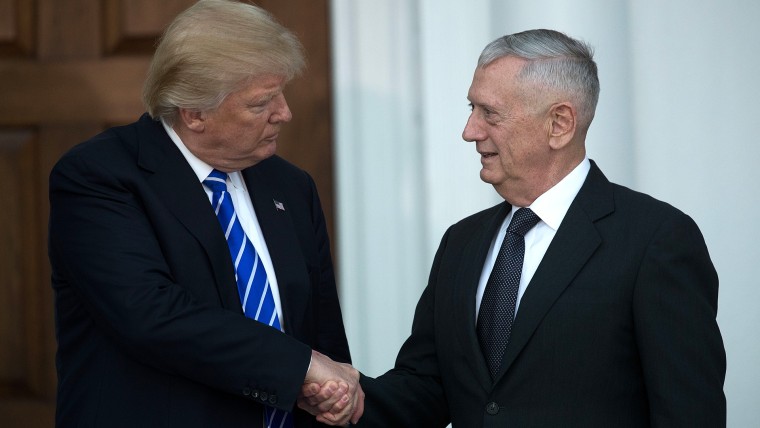In late March, Republicans on Capitol Hill started whispering to reporters about their "frustrations" with Defense Secretary James Mattis. Apparently, Donald Trump's Pentagon chief wasn't nearly as partisan or political as GOP officials had hoped, and it was causing some intra-party rifts.
Those same Mattis critics are probably even less pleased now.
After the weekend's terrorist attack in London, the Defense secretary told reporters, "I like learning about something before I talk. So let me look into it." It may not have been intended as a rhetorical shot at Donald Trump, but given the president's track record, Mattis' reaction sounded like a not-so-subtle insult directed at his boss.
Earlier in the day, Mattis spoke at a security conference in Singapore, where many U.S. allies pressed the Pentagon chief on the Trump administration's apparent desire to upend and undermine alliances that have lasted for generations and helped ensure stability throughout much of the world. The New York Times reported:
No sooner had Mr. Mattis finished his address than he was thrust into the uncomfortable position of defending White House policy decisions on trade, climate science and burden-sharing in a spirited question-and-answer session. The head of an Australian policy institute, Michael Fullilove, wanted to know if the United States, which shelved the Trans-Pacific Partnership Agreement and withdrew from the climate accord, was bringing about the destruction of the very global order Mr. Mattis was championing. [...]"To quote a British observer of us from some years ago, bear with us," Mr. Mattis said. "Once we have exhausted all possible alternatives, the Americans will do the right thing," he continued, invoking a famous quote often attributed to Winston Churchill.
That's a pretty remarkable thing for Mattis to say given the circumstances.
A report in The Economist raised a good point: "Mr Mattis is a distinguished man in an unenviable position. His mission here in Singapore is to reassure allies and warn foes that America remains the ultimate guarantor of the rules-based international order that has brought years of nearly-uninterrupted peace and prosperity to Asia. But if he does that job too well and insists that America's global role is unchanged, who will think that he really speaks for President Donald Trump?"
It is, to be sure, an awkward dynamic. America's Asia-Pac allies see a president threatening the world order without any apparent purpose or direction, but they then hear a president's credible Defense secretary doing his best to reassure friends of the United States that they have nothing to fear. It's hard to blame foreign officials for wondering whom to believe: an unhinged president or his measured cabinet secretary, claiming to speak on the president's behalf.
But that's partly what makes Mattis' response so interesting. "Bear with us" seems to reflect the retired general's understanding that Trump has rattled international nerves, and there are some who are prepared to give up on the United States.
"Once we have exhausted all possible alternatives, the Americans will do the right thing," Mattis added, almost certainly as a joke. Was it not a concession, though, that we're not doing the right thing now? And if we haven't yet reached the point at which America does the right thing, what exactly is the administration's plan to get us to where we should be?
